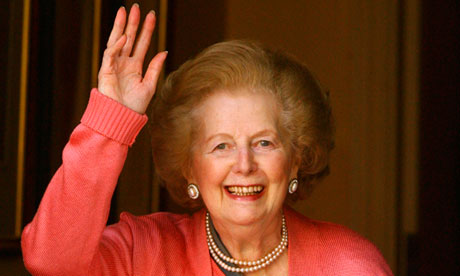Margaret Thatcher dies aged 87
![]()
The UK’s first female prime minister changed way Britons viewed politics and economicsMichael White
guardian.co.uk,

Margaret Thatcher, who has died at the age of 87. Photograph: Oli Scarff/Getty Images
Margaret Thatcher, the most dominant British prime minister since Winston Churchill in 1940 and a global champion of the late 20th century free market economic revival, has died.
Her spokesman, Lord Bell, said on Monday: “It is with great sadness that Mark and Carol Thatcher announced that their mother Baroness Thatcher died peacefully following a stroke this morning.
“A further statement will be made later.”
David Cameron said: “It was with great sadness that l learned of Lady Thatcher’s death. We’ve lost a great leader, a great prime minister and a great Briton.”
Buckingham Palace said the Queen was sad to hear the news and that she would be sending a private message of sympathy to the family.
The first woman elected to lead a major western state, Lady Thatcher, as she became after the longest premiership since 1827, served 11 unbroken years at No 10. She was only overthrown by an internal Tory party coup in 1990 after her reckless promotion of the poll tax led to rioting in Trafalgar Square.
Thatcher who was 87, had been in declining health for some years, suffering from dementia. The death of Sir Denis Thatcher, her husband of 50 years and closest confidante, intensified her isolation in what had proved a frustrating retirement, despite energetic worldwide activity in the early years.
After a series of mini-strokes in 2002 Thatcher withdrew from public life, no longer able to make the kind of waspish pronouncements that had been her forte in office – and beyond.
The “Iron Lady” proved a significant cold war ally of US president Ronald Reagan in the final showdown with the Soviet Union, which broke up under reformist pressures led by Mikhail Gorbachev, a Kremlin leader with whom Thatcher famously declared she could “do business”.
As a result, many ordinary voters in ex-Soviet bloc states saw her as a bold champion of their liberty, a view widely shared across the spectrum of mainstream US opinion – though not at home or among key EU partners.
Thatcher was an unremarkable mid-ranking Conservative politician – known chiefly for being a “milk-snatching” education secretary under Edward Heath (1970-74) – until she unexpectedly overthrew her twice-defeated boss to become party leader in 1975.
Within a decade Thatcher had become known around the world – both admired and detested – for her pro-market domestic reforms and her implacable attitudes in foreign policy, including her long-running battle with the IRA, which almost managed to murder her when it placed a bomb in the Grand Hotel, Brighton in 1984.
At home the emerging doctrine of Thatcherism meant denationalisation of state-owned industry – the new word “privatisation” came into widespread use in many countries – and defeat of militant trade unionists, notably the National Union of Miners (NUM), whose year-long strike (1984-85) was bitter and traumatic.
Boosted by the newly arrived revenues from Britain’s North Sea oil fields, Thatcher had room to manoeuvre and reform the ageing industrial economy in ways denied to postwar predecessors, and she used the opportunity to quell her enemies – including moderate “wets” in her own party and cabinet.
But she also deployed her notorious “handbaggings” in the European Union to obtain a British rebate – “my money,” as she called it. She was less successful in fending off the centralising ambitions of the “Belgian empire”, her description of the European commission, especially in the years when it was headed by the French socialist Jacques Delors.
A further sign of her losing her grip came when Thatcher, long a sympathiser with the apartheid regime in South Africa against the liberation movement, dismissed Nelson Mandela as a terrorist.
Her allies in the tabloid press, notably Rupert Murdoch’s Sun, egged her on. And, as the British economy recovered from the severe recession that her monetarist medicine had inflicted on it – to tame the unions and cure inflation – she briefly seemed invincible.
But untrammelled power, the defeat or retirement of allies who had kept her in check, led to mistakes and growing unpopularity. When Sir Geoffrey Howe, nominally her deputy, finally fell out with Thatcher – chiefly over Europe – his devastating resignation speech triggered Michael Heseltine’s leadership challenge.
It had been expected since he resigned as defence secretary over the Westland helicopter affair in 1986, Thatcher’s closest previous brush with political death.
Heseltine denied her outright victory in the first round of voting – then confined only to MPs – and she made way for John Major rather than risk losing to him in the second ballot.
In retirement she wrote highly successful memoirs in two volumes and campaigned energetically on behalf of the Thatcher Foundation, which sought to promote her values – free markets and Anglo-Saxon liberties – around the world. Speaking engagements made her moderately wealthy and she made her final home in London’s Belgravia.
Related Articles
From dream to reality: Turkey-EU relations in the 5th year of EU accession negotiations
![]()
Egemen Bagis“We stood our ground and we succeeded…”“We stood tall and we succeeded…”“Atatürk, rest in peace…”“Turkey’s path to the EU
Tunisian Elections: The Islamist Experiment
![]()
A Tunisian woman passes a wall covered with posters of candidates during last week’s campaign for electing the constitutional assembly.
A Middle East without borders?
![]()
The nation state is ripe for change and people power offers new opportunities for mapping the future of the region


